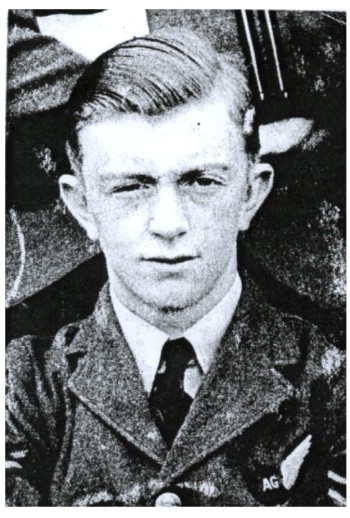|
SERGEANT FRANK ELLIOTT.
Frank Elliott was born on the 10th June, 1920, and enrolled at Etwall Primary School on the 30th August 1926. He left Etwall Primary School on the 24th June, 1931. having won a scholarship to Bemrose School in Derby
 A year later his brother Ernest, "Buster" Elliot, left the Primary School and went to Bemrose as the Repton Exhibitioner. A year later his brother Ernest, "Buster" Elliot, left the Primary School and went to Bemrose as the Repton Exhibitioner.
Frank went on to work at Rolls Royce, where his interest in aero engines flourished. He Joined the Royal Air Force Volunteer Reserve, and at the age of twenty was flying as an air gunner.
Frank Elliott was only just twenty-one years old when he was shot down, on a meteorological reconnaissance flight over the North Sea, on the 15th July 1941, sixty-six years ago.
Now, in 2007, memories of Frank as a young airman in uniform, were told to me vividly by another Frank, Frank Heath, who lives in Harpur Cottage. Etwall. During the 1939-1945 War, Mr Grimes, Frank Heath's grandfather, kept the Hawk and Buckle, and the eight-year-old Frank slept there nightly, going down into the cellars to sleep when the sirens sounded. Mrs Lambourne, Sergeant Elliott's mother, worked at the Hawk and Buckle with Mr Grimes, and she held her son's twenty-first birthday party there. He had come home on leave. and the party was a happy occasion. The young Frank Heath remembers so well the young airman in his uniform, and especially the shining insignia of an air gunner on his chest.
Sergeant Elliott returned to duty at Bircham Newton, King's Lynn, and shortly afterwards Mrs Lambourne came to tell Mr Grimes that she had received a letter from the Air Ministry with the terrible news that her son's plane had not returned from operations, and that he, and the crew, were presumed missing. Frank Heath remembers still the fortitude and bravery of Mrs Lambourne as she brought the sad news to his grandfather, Mr Grimes.
Sergeant Elliott's family has faithfully, and with sadness, preserved the letters written to his mother, Mrs. Lambourne, in Etwall, from the Officer's Mess, Royal Air Force, Bircham Newton, King's Lynn.
The first letter was written on the 18th July 1941, informing Mrs Lambourne of her son's last flight.
"Dear Mrs. Lambourne,
It is with deep regret that I have to confirm my telegram of the 15th July, informing you that your son has been reported missing as a result of air operations.
He was detailed as the air gunner of an aircraft which took off early on Tuesday morning to carry out an operational meteorological reconnaissance flight over the North Sea, from which, unfortunately, it failed to return. An intensive search was carried out the same and the following day, but with no avail.
At the moment I have no knowledge of their fate beyond that they are missing, but if I receive any information I will let you know immediately.
Your son was a very valuable member of my flight and one for whom I personally had a” (there are missing words here but they were probably ‘high regard’).
The officer's signature is missing, too, but I wonder how many times he had to write similarly tragic letters to the stricken parents of young men who gave their lives for their country.
Three years later, Mrs. Lambourne received a letter from the Air Ministry, (Casualty Branch) 73/77 Oxford Street, W1, dated the 5th of May, 1944.
"I am directed to inform you that whilst the Department is reluctant again to refer to the loss of your son, Sergeant Frank Elliott, Royal Air Force, it is considered that you would wish to know that as a result of exhaustive enquiries through the International Red Cross Committee, Geneva, a report has now been received which states that the bodies of two unknown airmen were recovered from the wreckage of a crashed aircraft, and buried on the 23rd August, 1941, in grave No 7, in the Old Cemetery at Tondern, Denmark.
On the 19th September, 1941, the body of Sergeant Culley, the pilot of your son's aircraft, was washed ashore in the vicinity, and was buried in grave No 6 in the same cemetery.
Although it cannot be definitely established that all three airmen belonged to the same crew, the circumstantial evidence appears to support this theory. It seems probable that shortly before the aircraft crashed, Sergeant Culley baled out over the sea, and that your son and the other members of the crew were killed in the crash. In writing this, I am to assure you of the Department's very sincere sympathy with you in your loss."
After years of anxiety, the waiting was over, but the grief and sadness remained.
|